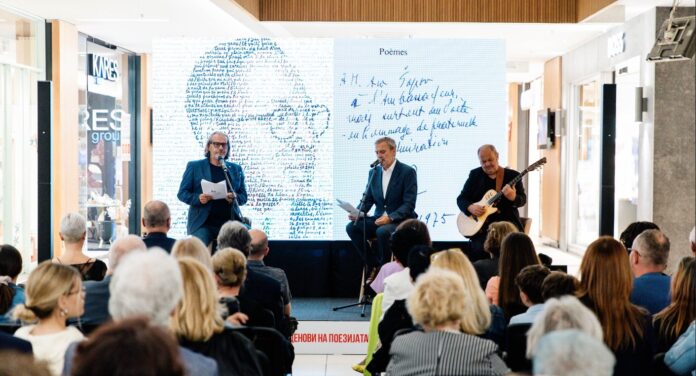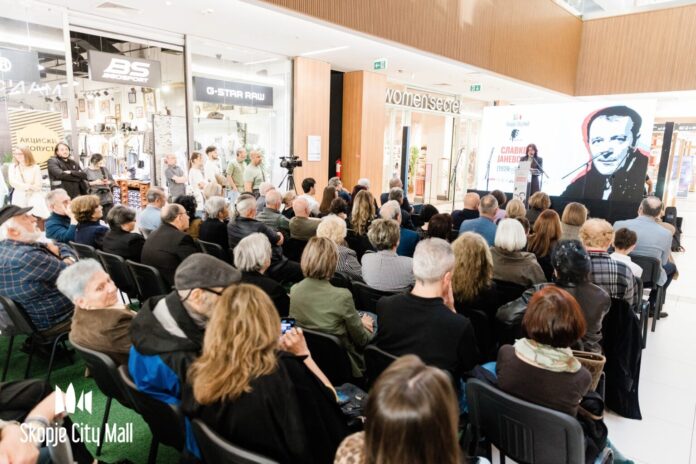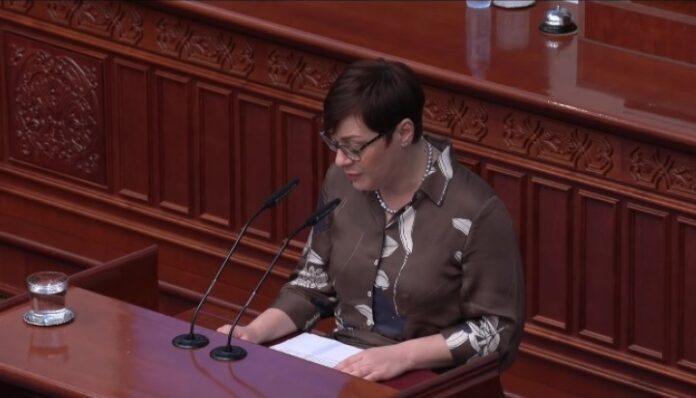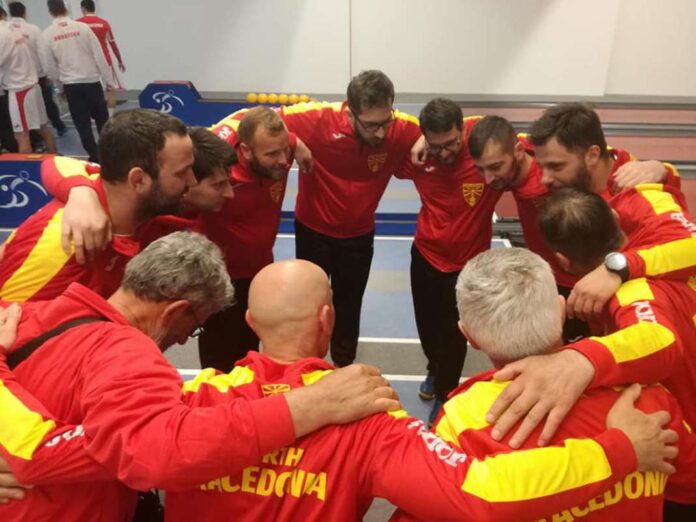The verses of Macedonian poets have preserved our word for centuries

On the occasion of the Days of Poetry
26 years ago in Paris is the International Day of Poetry – March 21, which is celebrated every year with poetry readings in the world and in Macedonia, and for the second year, in that context, the Foundation « Aco Shopov – Poetry » is also organized as a city festival. This year we celebrate the delayed, as if in accordance with the delayed outflow of grace and sunny in the spring. Days of Poetry, celebrating it, at the same time seek to reaffirm the acoustic performance of poetic Word not only as a centuries -old human experience whose record is undoubtedly a vital part of our, not only spiritual but also physical memory, but also as a powerful center of work. In fact, the very uprising of the day/days of poetry is epistle. These days are the task, mission and call for the revival of the world of poetry in finding new alternative ways of promoting it as a vital and irreplaceable, irreparable space of human expression and creation.
The famous song « Thousands of Seven -Sixty -Summer » we heard as an introduction to today’s celebration, best points out how poetry powered powerfully unites us in a heart -beaten heart, whether we hear her performance in Osama or Osama, by the Lake. For this song, my colleague Valentina Mironska-Hristovska will write that it is a « real folk anthem » of the Macedonians. And indeed, that song lives so naturally in the collective memory that many, in fact, not without foundation, think that it is a folk, not the author’s song by Grigor Prlicev that he would write in 1872 in honor of the first, after many years, the Slavic Archbishop, Nathanael Kojviski (from the village of Kuviki). In the joy of the Natanail Kuchevishki on the shores of Lake Ohrid, as a then teacher in Ohrid, Prlicev will sing and pour out all the 110-year-old folk mourning, who lives in our hearts today as a lively and fiery declaration that flames with the light. Although written for the welcome of the « Slavic bishop », the song was first sung at the Prlichev’s wedding, as he himself states in his « autobiography ». She will still notice: « That song has helped us to eradicate Greekism much more than all our reputation feats » (Prlicev, Autobiography, 1995: 131).
This year, when we celebrate the 80th anniversary of the codification of the Macedonian standard language, within the days of poetry, we also celebrate the verses of the Macedonian poets, who have preserved our word for centuries, fertilized in our own poetry, and when we read them, we are reading them, and we are reading our verses, Reception through the spirit of the new times that raise.
The common struggle of the Struga brothers, Dimitar and Konstantin Miladinovs, who will pay the printing of the collection of Macedonian folk poetry with their lives, so powerful that they will not be executed to the enemies of the Macedonian Word. They are nourished in secret, so that their grave shines like a sanctuary for countlessness and worship. « All the beginning songs have been heard by women, » Konstantin Miladinov will write in his « Preface » of the Proceedings, describing the folk consensus regarding the female memory, the dance of the Macedonian folk song, her ritual character, which in the female memory. In this preface, Konstantin Miladinov will also describe the code of the Macedonian folk song, her verse, metric and appropriate topics, and based on that knowledge, he himself will write his inspirational verses of Macedonian romanticism and rebirth. I call it « the son of a female oral tradition », and so is the fate of the Struga Brothers Proceedings, female, « My Name – Your Last Name », because they will be forced to agree from the Collection to remove the notes of the third brother, the music scientist, for the Macedonian, Music, Music. Additional editorial in Croatia Counted folk songs from Bulgaria, called « Eastern », opposite the Macedonian, finally listed as « Western ». But we don’t have to know who they are. The superior Macedonian song in the collection is immediately recognized by the acoustic closeness that the Macedonian Word addresses us. The same thing with which Konstantin Miladinov in Russia – in an effort to realize the project of printing « Macedonian folk songs », as he himself writes in a letter of 1860 – will sing the nostalgic verses of the song « T’ga for the South », with which the « South » poet is released every year. The scattering of her world -wide, light canopy above us.
We celebrate this year both the nimble and persistent spirit of Galichnik Gjorgija M. Pulevski, in the sign of two significant anniversaries in his diverse literary work: the 150th anniversary of his trilingual vocabulary, in which Macedonian lexicon appears in the Albanian and Turkish, published in Belgrade (1875). Five years later, he will also announce in Sofia the first Macedonian grammar « Slugging Rechovska » (1880, whose full title is « Slavic-Nasthens-Macedonian-Macedonian Slogan Rechovska for Required Orthodox-Jasichesko-Wide »). He is also the author of the first Macedonian historiographical book « Slavic-Macedonian General History », but also of one of the most beautiful patriotic poems of the rebirth « Fairy Macedonian » (1878), as well as the poetry book « Macedonian Song » (1879).
Fifteen years after the publication of Pulevski’s trilingual and ten after the publication of his grammar in the Macedonian language, 135 years ago the first European scientific paper dedicated to the study of the properties of the Macedonian language, the doctoral dissertation of the Balto-German linguist Leonard Gotthilf Masing, with the greatest of the subject of the Macedonian language and the subject of the Macedonian language. academic level within European language science.
This literary-historical context should certainly be mentioned and the 100th anniversary of the publication of the « Abecedar »-the primer in Macedonian intended for the Macedonian national minority in Greece, prepared by a special commission of the Greek government, under the auspices of the Association of Nations in Geneva, which will never be, At the Civil War in Greece, 27 years after its seizure, all Macedonian schools in Aegean Macedonia, which had about seventy in number, according to some sources, will be wiped out.
ASNOM Macedonia, on the verses of Racin as the founder of the contemporary Macedonian literature, will take a plethora of poets and literature from different poetry generations to celebrate Macedonian poetry in the world, and at the same time in Macedonia they will bring the world. Without no exaggeration, we can determine that the Macedonian poetry word, mediated by the Struga Poetry Evenings Festival, in the period of our socialist development, is our most important cultural ambassador in the world. Our poetry word is the one with which the newly established nation becomes visible and recognizable in the world. This year, it is 60 years since the 1965 SPE has become an international poetry festival. A small poetry reading in Struga in 1961, on the occasion of the 100th anniversary of the Miladinovci Proceedings, as if the « effect of the butterfly » will grow into a grandiose, world-renowned event, which will put the Macedonian poetry a focus. First President of the SPE Board in 1962 It is the poet Aco Shopov, the patron and today’s « Days of Poetry » event.
Today we also celebrate the anniversary of the birth of modern Macedonian poets and poets: Slavko Janevski and Liljana Shalovska (105 of the birth), Gogo Ivanovski (100), Abdulazis Islami, Fahri Kaya and Bistrica Mirkulovska (95), 95, 95. Georgi Stalev’s birthday.
To these poets, the light of the new day pages quite an other challenges than their predecessors. They sound as if strings of the Eolian harp that tremble under the flight of the shadows and ghosts that the light throws on that new day. Poets know many things at all and prerequisite and unable to silence them out of the depths of their own ease with the world in a way that is possible only on the poetic network for the disrespectful. In the context of celebrating the 80th anniversary of the codification of the standard Macedonian language, I would mention the early song of Slavko Janevski, « Alphabet ballad » (1944), which contains all of his further literary project: both poetry and narrative, which is the « new day ».
I am aware that no song can be captured in all its far -sided braces on the disadvantaged, as I have already mentioned ahead. Therefore, let’s allow them to speak the verses themselves. To hear them, of course, we need to turn ourselves into sensitive instruments that vibrate in the wake…
Natasha Avramovska









